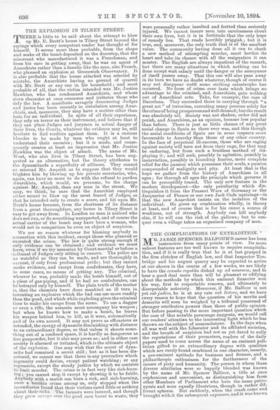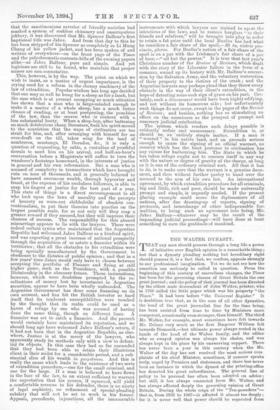THE COMPLICATIONS OF EXTRADITION. • M R. JABEZ SPENCER BALFOTJR'S career
has been instructive from many points of view. Its more salient features are too well known to require recapitula- tion, and if it is really true that he is at last grasped in the firm clutches of English law, and that Inspector Ton- bridge and his august quarry may be expected to arrive at our shores in the course of a few weeks, we are likely to have the crambe repetita dished up ad nauseam, and to hear a good deal more than will be pleasant or edifying about the methods by which this eminent financier won his way, first to respectable renown, and ultimately to disreputable notoriety. Moreover, if Mr. Balfour is not yet sub judice, he is at any rate sub lido's, and we have every reason to hope that the question of his merits and demerits will soon be weighed by a tribunal possessed of stronger retributive powers than those of public opinion. But before passing to the more important question which the case of this notable personage suggests, we would call our readers' attention to the interesting light which he has thrown on the subject of nomenclature. In the days when all was well with the Liberator and its affiliated societies, and the breath of suspicion had not as yet dared to sully the reputations of their promoters, readers of the daily papers used to come across the name of an eminent poli- tician gifted to an extraordinary degree with qualities which are rarely found combined in one character, namely, a pre-eminent aptitude for business and finance, and a philanthropic enthusiasm for the furtherance of the causes of piety and humanity. The person in whom these diverse attributes were so happily blended was known by the name of Mr. Spencer Balfour, a title at once euphonious and. convenient, as distinguishing him from other Members of Parliament who bore the same patro- nymic and were equally illustrious, though in rather dif- ferent spheres. But suddenly, when the crash came and brought with it the subsequent exposure, and it was known that the sanctimonious exterior of friendly societies bad masked a system of reckless chicanery and unscrupulous jobbery, it was discovered that Mr. Spencer Balfour's first baptismal title was Jabez. And from that day to this he has been stripped of his Spencer as completely as Li Hung Chang of his yellow jacket, and has been spoken of and written of everywhere—on the front page of the Times and the polychromatic contents-bills of the evening papers alike—as Jabez Balfour, pure and simple. And yet logicians are still to be found, who maintain that proper names are non-connotative.
This, however, is by the way. The point on which we wish to insist, as a matter of urgent importance, is the crying need for a reform in the clumsy machinery of the law of extradition. Popular wisdom has long ago decided that one may as well be hung for a sheep as for a lamb, but the case which is at present occupying so much attention has shown that a man who is large-minded enough to make it a matter of a whole sheep, has a much better chance of evading, or at least postponing, the penalties of the law, than the craven who is content with a less substantial booty. When a shop-boy, after battening on much deleterious cheap literature, feels his spirit moved to the conviction that the ways of civilisation are too strait for him, and, after arranging with himself for an over-draft on the till, takes wing for the land of sombreros, mustangs, El Dorados, tftc., it is only a question of requesting, by cable, a custodian of youthful morals to meet him on his arrival, and half-an-hour's conversation before a Magistrate will suffice to turn the wanderer's footsteps homeward, in the interests of Justice in general and his own reformation. But a, man who is accused of complicity in transactions which have brought ruin on tens of thousands, and is generally believed to have amassed enormous wealth, through hypocrisy and fraud, at the expense of his credulous followers, is able to snap his fingers at justice for the best part of a year. This state of things is a direct encouragement to all who look upon the laws of morality and the precepts of honesty as worn-out shibboleths of obsolete con- ventionalism, to put their theories into practice on the largest possible scale, for so not only will they reap a greater reward if they succeed, but they will improve their chances of success. The responsibility for this absurd miscarriage appears to lie with the lawyers. There were indeed certain cynics who maintained that the Argentine Republic had welcomed Jabez Balfour as a kindred spirit, and was expecting a great increase of national prosperity through the acquisition of so astute a financier within its territories ; that all the obstacles to his extradition were being specially manufactured by the Government in obedience to the dictates of public opinion ; and that in a few years' time Jabez would only have to choose between accepting the portfolio of Finance and flying at still higher game, such as the Presidency, with a possible Dictatorship in the obscurer future. These insinuations, however, which were doubtless prompted by the re- collections of money lost by investment in Argentine securities, appear to have been wholly unfounded. The Argentine Government has done some financing on its own account, and has hit the British investor so bard itself that its tenderest susceptibilities mere touched by the thought that its realm could be used as a haven of refuge by one who was accused of having done the same thing, though on different lines. A financier was set to catch a financier. And the proverb would certainly have maintained its reputation, and we should long ago have welcomed Jabez Balfour's return, if it had not been that in the Argentine Republic, as else- where, Justice is at the mercy of the lawyers, who apparently study its methods only with a view to defeat- ing its objects. In this case they had so far succeeded that they had been able to retain their illustrious client in their midst for a considerable period, and a sub- stantial slice of his wealth in perpeguum. And this is really the cause which leads to the existence of two sorts of extradition procedure,—one for the small criminal, and one for the large. If a man is believed to have flown in the face of the law, to an extent sufficient to warrant the expectation that his person, if squeezed, will yield a comfortable revenue to his defender, there is no nicety of legal sophistry, no refinement of special-pleading subtlety that will not be set to work in his favour. Appeals, precedents, injunctions, all the innumerable instruments with which lawyers are trained to ups et the intentions of the laws, and to restore burglars "to their friends and relations," will be brought into play in order to retain a fat prize until the local Buzfuz has had what he considers a fair share of the spoil,—Et victrix pro- vincia, ploras. For Buzfuz's notion of a fair share of the spoil is on a par with the Irishman's fair share of a pot of beer,—" all but the pewter." It is true that last year's Christmas number of the Review of Reviews, which dealt with the story of the Liberator failure in the form of a romance, wound up its history with Mr. Balfour's conver- sion by the Salvation Army, and the voluntary restoration of their property to the victims of the crash ; and the Argentine lawyers may perhaps plead that they threw every obstacle in the way of their client's extradition, in the hope of detecting some such sign of grace on his part. Cer- tainly, such a denouement would. have been highly edifying, and not without its humorous side ; but unfortunately such things do not occur, except in the pages of the Review of Reviews; and besides, nothing has so stimulating an effect on the conscience as the prospect of prompt and summary judicial retribution. The system which renders such delays possible is evidently unfair and unnecessary. Extradition is, or should be, an 'entirely simple matter. If a man is "wanted" in his native land, and on grounds serious enough to cause the signing of an official warrant, no country which has the least pretence to civilisation has any excuse for harbouring him. The State in which he has taken refuge ought not to concern itself in any way with the nature or degree of gravity of the charge, as long as it is one of the ordinary criminal sort. All that it has to do, is to make sure that the warrant is a genuine docu- ment, and then without further parley to hand over the accused to the arm of his own law. An international agreement, by which extradition procedure for all criminals, big and little, rich and poor, should be made universally prompt and simple, is urgently needed. If the present glaring example could move the diplomatists of all nations, after due drawing-up of reports, signing of protocols, and interchange of other indispensable for- malities, to bring such an agreement into being, Mr. Jabez Balfour—whatever may be the result of the impending judicial proceedings—will have done at least something to earn the gratitude of mankind.







































 Previous page
Previous page